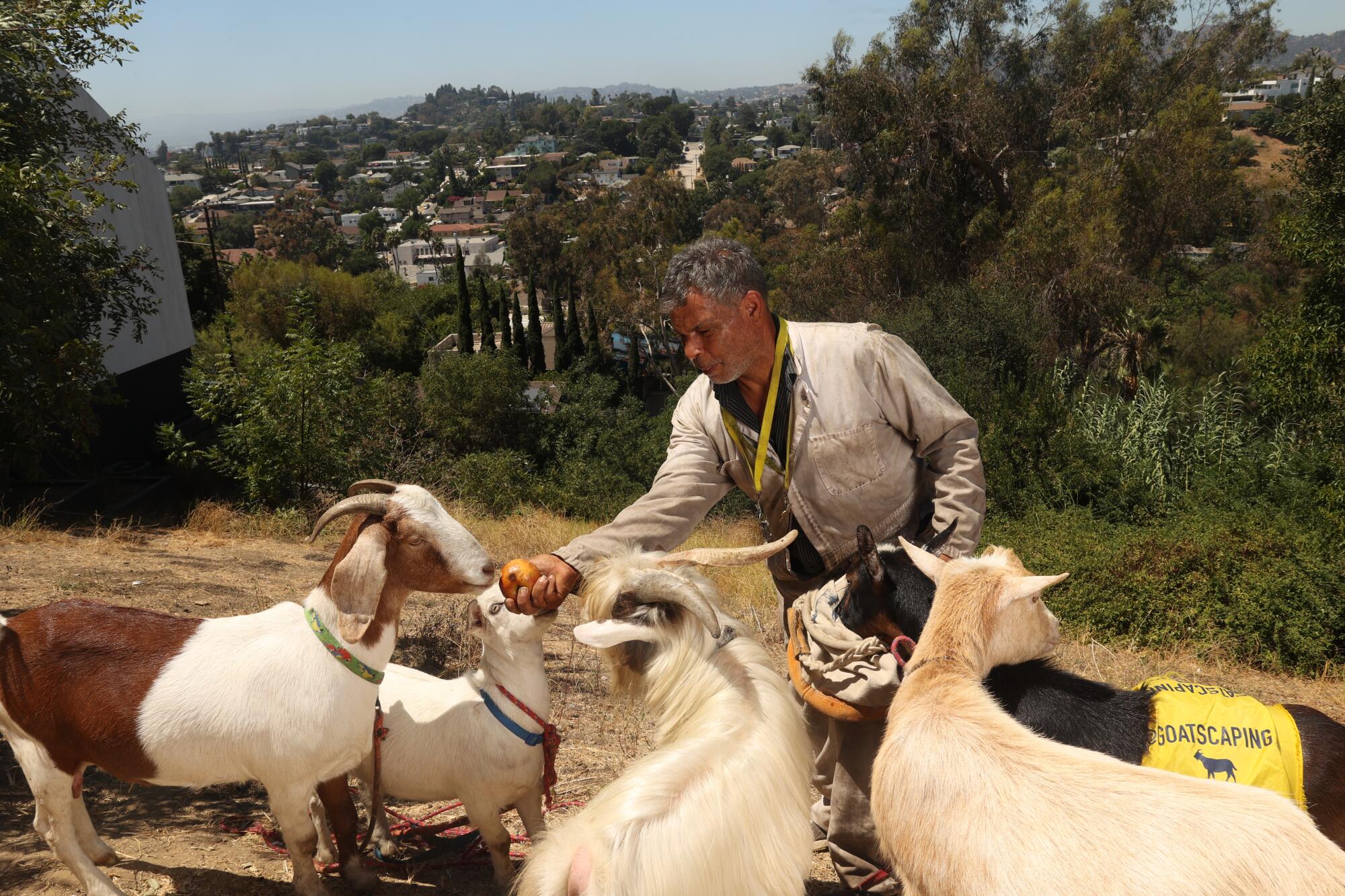
- Share via
In the hills of Elysian Heights, among the blond weeds, a quintet of goats graze lazily, munching on seemingly anything in their path.
It’s a pastoral scene in the middle of the city. The Elysian Heights hills are some of the steepest in Los Angeles — with roads up to 32% grades — and they’re perfect for the mountain-loving goats. But recently this idyllic overlook became a scene of drama and chaos, with two of the goats snatched off the hills by authorities who claimed their owner was allowing the “aggressive” animals to roam untethered and near residences, breaking the law.
The sudden seizure led to a flurry of legal filings as the owner, Dael Wilcox, struggled to repatriate his animals before they were put up for adoption by the city Department of Animal Services. Parts of the story were first reported by Eastsider LA.
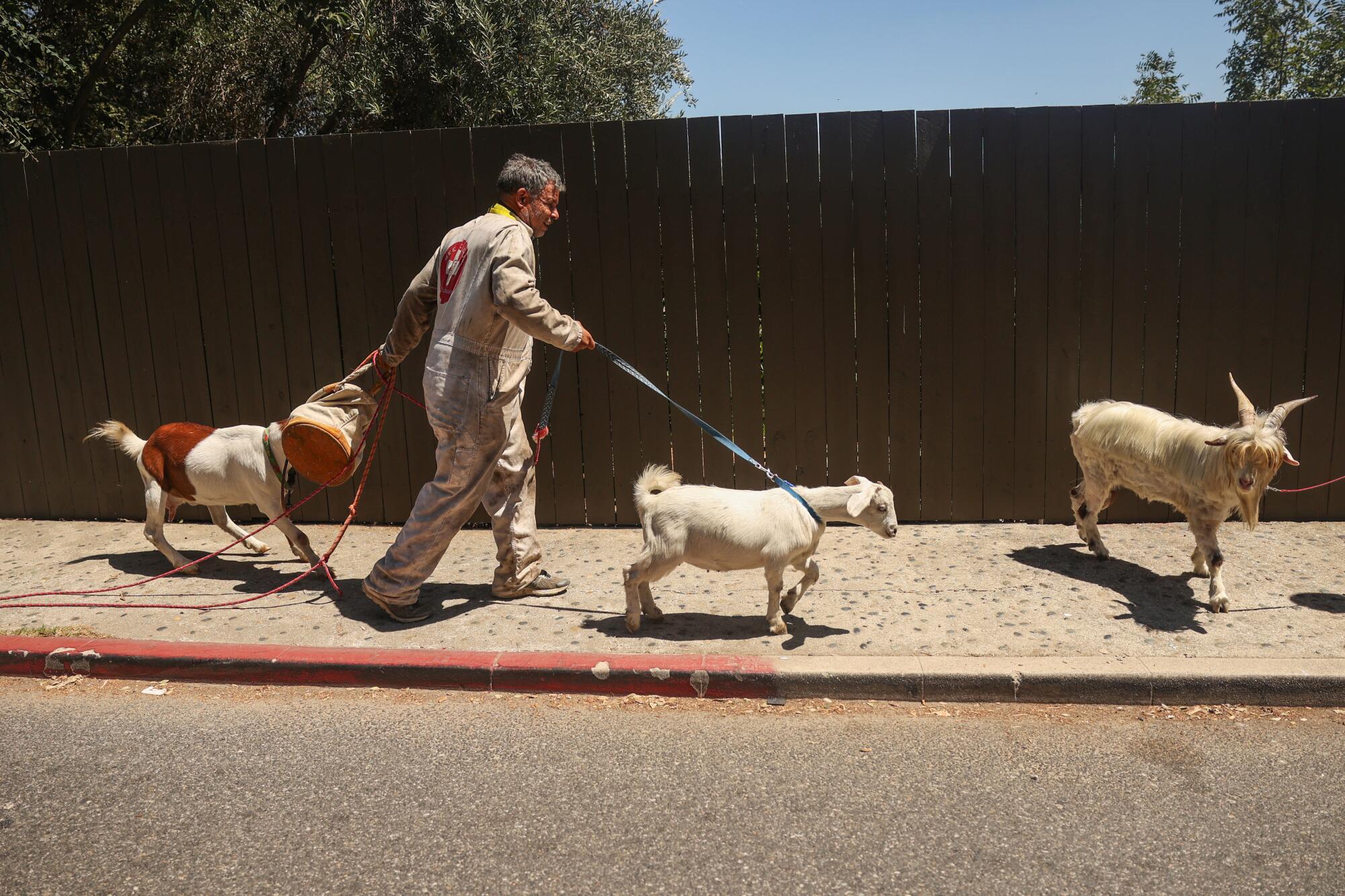
Even as Wilcox sued the city over what he saw as goatnapping spurred on by unhappy neighbors, city officials clapped back with a restraining order. Wilcox was accused of shoving a Department of Animal Services worker and trying to storm an animal shelter to regain custody of his expropriated goats. He denies the allegation.
“I feel I’m at war,” Wilcox said.
Although Wilcox said he’d had good interactions with Animal Services in the past, he feels the “bad apples” — the two officers who took away his goats — are out to get him.
The Department of Animal Services declined to comment because of pending litigation.
- Share via
Wilcox says he uses his five goats for a “goatscaping” business — not entirely uncommon in California — like landscaping but with goats. The animals clear land of unwanted brush, branches and grass, and whoever rents them gets to watch goats peacefully at work munching away.
Wilcox got Frosty — a chunky goat the color of a softly toasted marshmallow — in 2021 when he lived in Northern California. In 2022, he moved to Riverside with Frosty and Frosty’s new friend, Pepe. He expanded his herd further that year, adding Beatrice and Benito, who begat Mellie.
His love of animals began when he was young. He grew up with dogs, cats, a parakeet and a parrot that lived to 60. A close childhood friend had a goat, and Wilcox and his brother learned to milk the animal. When he was at Pacific Union College in the 1980s, Wilcox liked to visit a Russian great-uncle who owned goats. Wilcox would drink the goat milk.
Decades later, Wilcox would buy his first goat. And the first property he had Frosty goatscape was the same place where Wilcox milked a goat back when he was 8 years old. It felt like kismet.
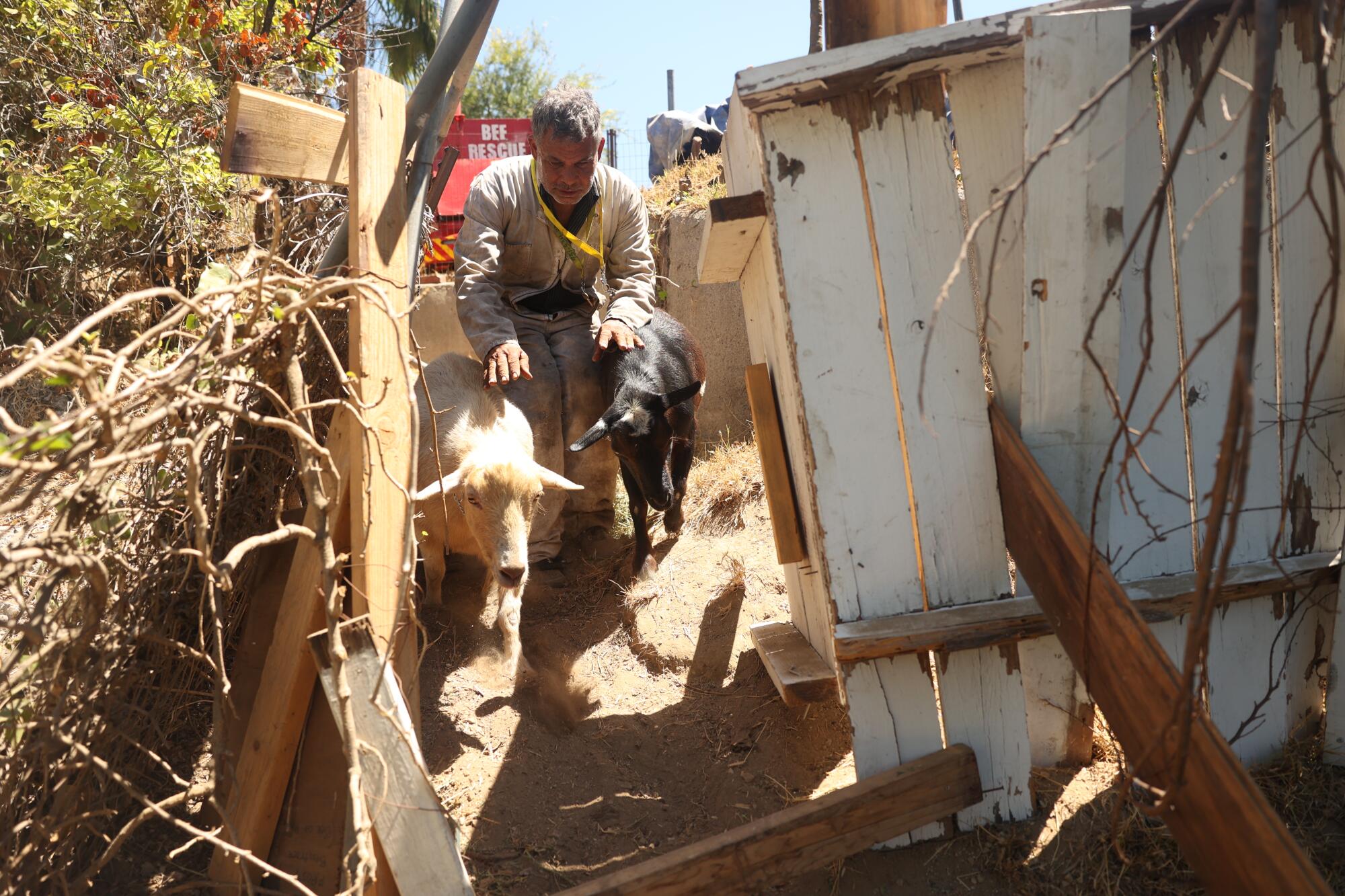
Wilcox says he brings the goats from Riverside to Los Angeles to work for his business, Goatscaping L.A. He also rents a place in Elysian Heights, where he keeps a goat shed and supplies for his bee rescue business. Despite the Elysian Heights address, Wilcox says he and the goats live in Riverside. It’s not clear how much time the animals spend in Los Angeles, but neighbors said that Wilcox and the goats appear to live at the Elysian Heights address.
What’s clear to his Los Angeles neighbors, however, is that goats in the middle of the city can cause problems. Wilcox’s next-door neighbors have had so many negative experiences with the goats and their owner that they filed for a restraining order, according to court documents.
“We love animals,” said Andrew Paszterko, 77, who has lived in the house next to Wilcox’s property for more than three decades. “But it became a total nuisance.”
The goats have gotten loose half a dozen times, and Paszterko’s family has helped Wilcox round them up using brooms, he said. The goats have also attacked the neighbors and climbed on top of their car in a shared driveway to eat the leaves off an overhanging tree, Paszterko wrote in his Aug. 7 filing.
The most shocking incident came one night when the neighbors were about to go to sleep — their daughters and grandchildren were visiting — and five goats ambled into their living room.
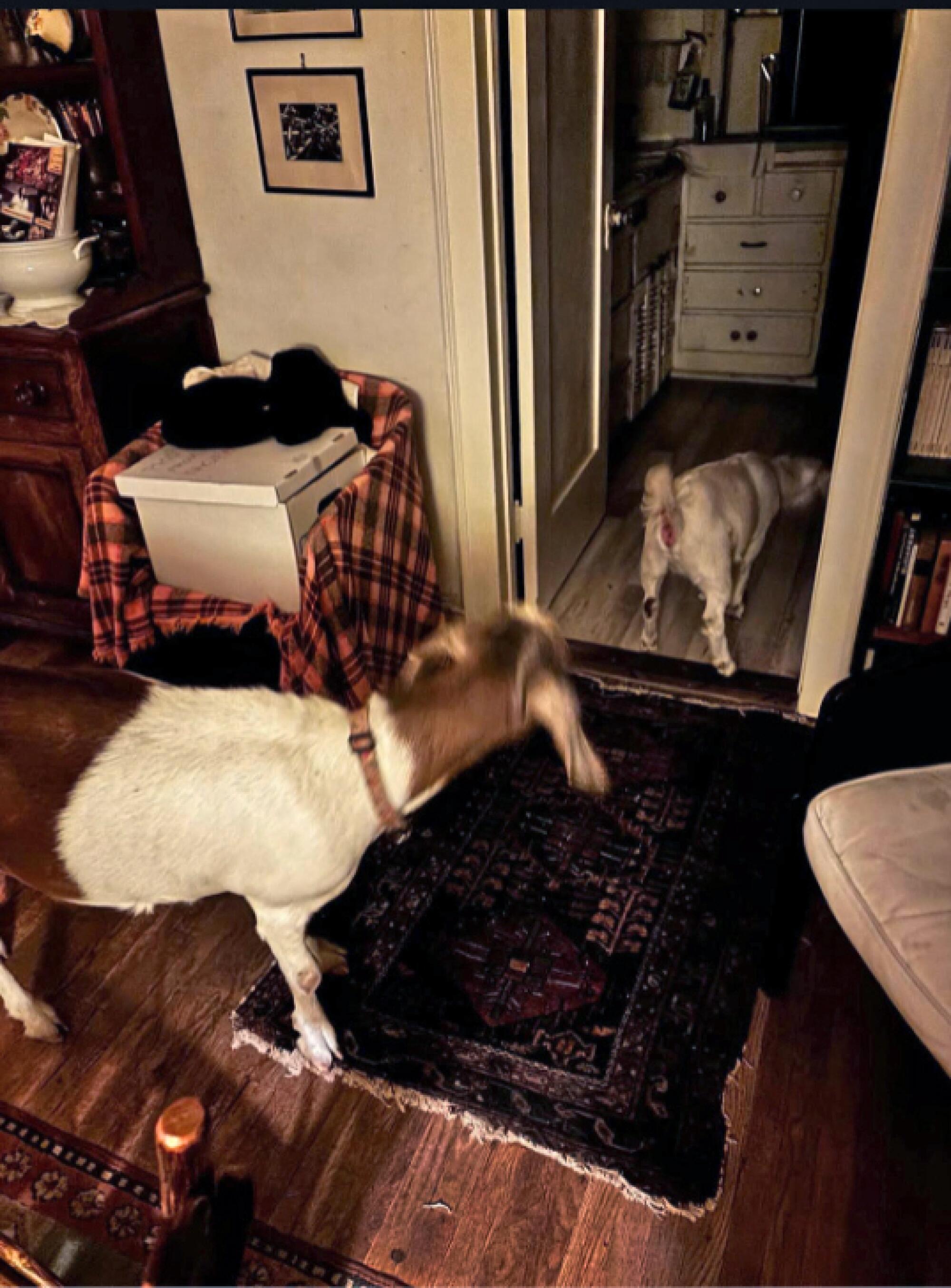
“I was astonished. You don’t expect them in your house,” Paszterko told The Times.
He called to his wife, Zsuzsa, in the bedroom.
“He was frozen in his chair. The goats were in the living room walking slowly around, smelling things,” she told The Times. “After that I had to clean the house because they pooped everywhere.”
Wilcox said the Paszterkos were “using our already overburdened court system for foolishness.”
A Los Angeles County Superior Court judge has denied the restraining order request pending a Friday hearing.
The animals have also caused issues with Wilcox’s landlady, whose tip to Animal Services officers led to last month’s seizure of Wilcox’s goats. She was frustrated that he was allowing the creatures to roam “unsecured” on her property, officers wrote in court papers.
The goats were on a job July 31 on North Alvarado Street in Elysian Heights, clearing brush from a resident’s property, when the officers arrived around 11 a.m. The steep hillside lot belongs to Tino Schaedler, who told The Times he’s happy to have the goats graze on his property and that local kids and residents love the animals. Schaedler’s lot is just a block from the property Wilcox rents on Alvarado.
- Share via
Dael Wilcox records as Animal Control officers attempt to impound his goats on July 31.
“I observed three goats chained and two to three free-roaming goats on an empty and unenclosed hillside lot. There was nothing to prevent the goats from wandering beyond the unenclosed lot,” wrote Animal Control Officer Eduardo Ananya in a court declaration.
Not only were the goats untethered, the officer wrote, but they also lacked water or shade on a hot day.
Wilcox denied that any of the five goats were untethered on the hill that day. Video reviewed by The Times appeared to show the goats connected to ropes on the hill the day they were impounded. Video also showed buckets of water and shady areas for the animals.
Wilcox said he reported Ananya’s claims to the Los Angeles County district attorney’s office in the hope perjury charges would be filed.
The officers seized the goats based on two municipal code rules they said Wilcox violated.
One rule states that animals cannot graze on an unenclosed lot in a way that would allow them to go beyond the boundary of the lot. The other makes it illegal for a person to allow their animal to be “at large in or upon any public street.”
The officers took Beatrice and Benito but not the other three goats.
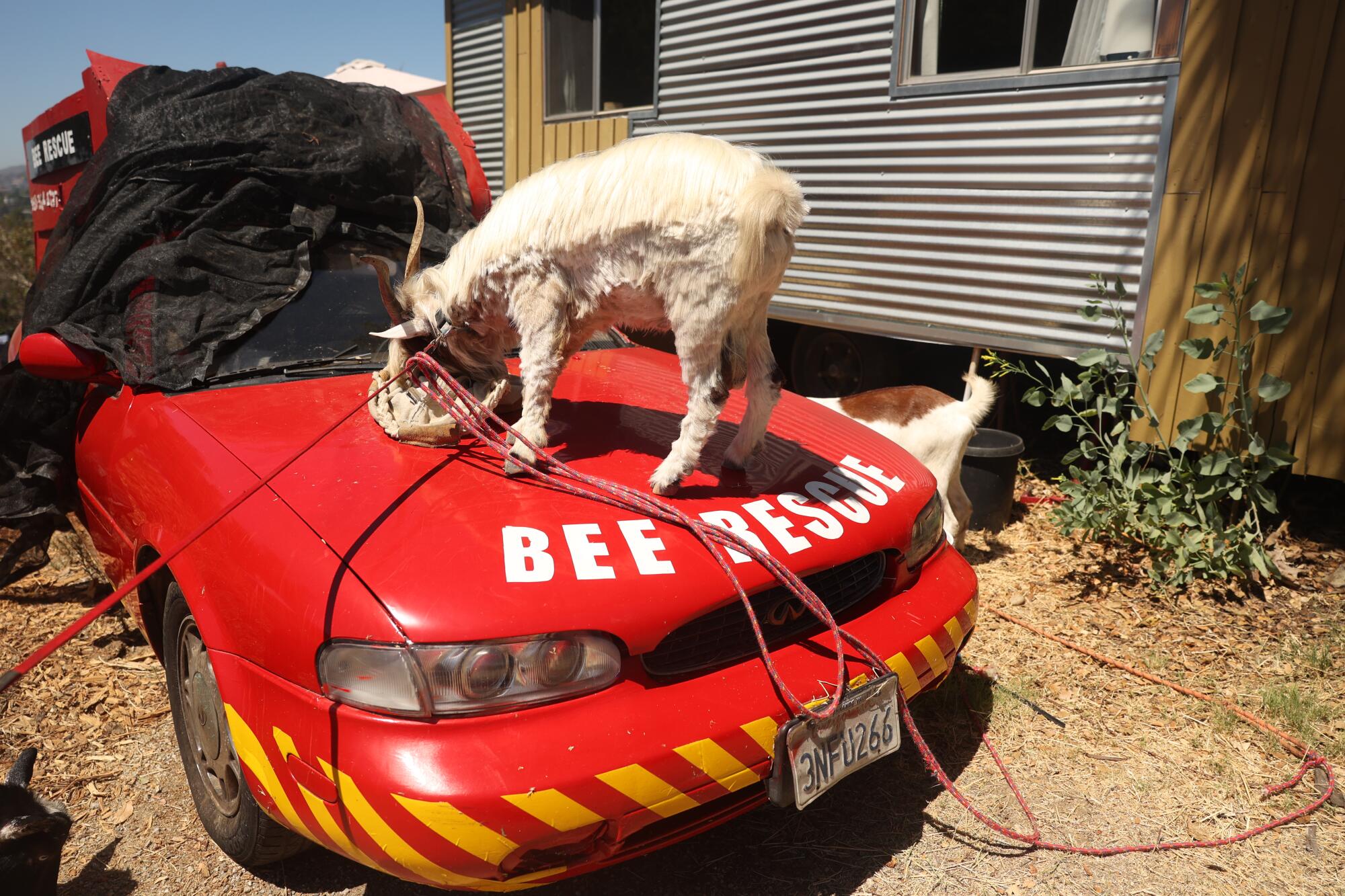
Wilcox filmed much of the incident, getting in officers’ faces as they attempted to round up the stubborn animals. One officer threatened to have Wilcox arrested if he touched him.
During the roundup, Wilcox said he was able to free Frosty after he was lassoed by officers. Wilcox said he yanked the lasso off Frosty’s neck. One of the officers confirmed in his declaration that Wilcox “physically pulled a leashed goat from my possession.”
The officer said he and his colleague wanted to impound all of the goats but managed to impound only two. They were not able to get all five due to Wilcox’s “aggressive behavior.”
That evening at 7, Wilcox went to Los Angeles Animal Services’ North Central Shelter, where Beatrice and Benito had been taken.
He demanded their return, but staff told him that the shelter was closed and to return during business hours, according to a declaration filed by Oscar Peregrina, the supervisor in charge of operations at the shelter.
“Wilcox became irate and attempted to climb over the shelter wall to get into the kennels,” Peregrina wrote. “Upon seeing his actions, staff called LAPD, but Mr. Wilcox left the premises before interacting with the police.”
Wilcox denied trying to enter the kennels. He claimed he was just trying to take video over the wall to see if he could see Benito and Beatrice.
He returned the next day, bringing Mellie with him. Peregrina told Wilcox that before the shelter could return the goats, officials had to make sure he was “meeting the necessary distance requirements” — keeping the goats 35 feet from Wilcox’s dwelling and 75 feet from other dwellings.
“He was again very aggressive with the entire staff,” Peregrina wrote.
When Peregrina tried to close and lock the door to the shelter, he wrote, Wilcox put his hands on him. Peregrina was able to close the door. Wilcox denied pushing Peregrina.
“He then began kicking the locked door in what appeared to be an attempt to break it down,” Peregrina wrote, “and ultimately broke both the door frame and the lock. He then began yelling that he wanted his goats back. LAPD was called immediately, but again Mr. Wilcox fled.” Peregrina said Wilcox did about $10,000 damage to the door.
He did kick the door, Wilcox said.
“I kicked it once, it wouldn’t open. Kicked it again, wouldn’t open. I kicked it multiple times until finally it started to budge a little bit,” Wilcox said. “The door latch came loose. The door rattled open. The door did not break down.”
After the second interaction, Peregrina filed a request for a workplace violence restraining order.
The judge granted the request, ordering Wilcox to stay away from the shelter and refrain from harassing the workers there.
Wilcox claimed the restraining order was “bogus” and that he had not been served in the case.
But Wilcox had other problems.
The Department of Animal Services sent him a letter after the impounding of Beatrice and Benito, saying that the goats would be put up for adoption on Aug. 9.
On Aug. 7, Wilcox and his brother, Earl Cox — the goats’ co-owner — filed suit against the city for “intentional interference with prospective economic advantage” as well as for violating the goats’ animal rights.
“The City of Los Angeles had no legal authority to impound the goats,” the brothers wrote in the suit. “The goats were tethered on private property with adequate food and water and monitored by co-owner Dael Wilcox.”
On Aug. 14, both sides appeared in Los Angeles County Superior Court before Judge Stephen Goorvitch and agreed to a partial settlement.
In the settlement, the city did not admit that the seizure was unlawful, and Wilcox did not concede that it was lawful. The city did agree to release Beatrice and Benito to Wilcox in exchange for a redemption fee of $52.
While L.A. County permits goatscaping and even has a list of registered “goat vendors” who can provide the service, Wilcox is not on the list and concedes he does not have a permit. He said this is because he is based in Riverside and rents the goats out only in Los Angeles.
Goorvitch said his order granting the release of the goats to Wilcox does not necessarily mean Wilcox is legally “permitted to do ‘goatscaping’ under Los Angeles Municipal Code.”
That issue, Goorvitch wrote, “must be resolved at trial.”
More to Read
Sign up for Essential California
The most important California stories and recommendations in your inbox every morning.
You may occasionally receive promotional content from the Los Angeles Times.













